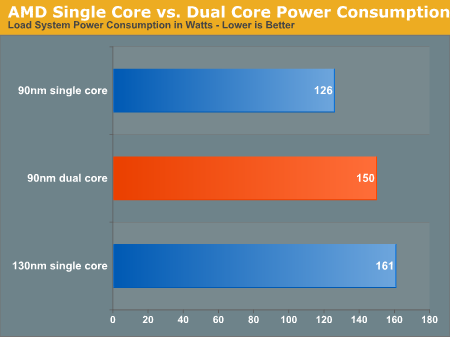AMD's Athlon 64 X2 4800+ & 4200+ Dual Core Performance Preview
by Anand Lal Shimpi on May 9, 2005 12:02 AM EST- Posted in
- CPUs
Power Consumption: Athlon 64 vs. Athlon 64 X2
In Part II of our preview of Intel's dual core processors, we noted that the addition of a second CPU core generally didn't increase overall system power consumption by that much. In fact, the Pentium D 2.8GHz vs. single core 2.8GHz comparison yielded only a 15% increase in system power consumption under load for the dual core CPU. While we didn't look at power consumption in our dual core Opteron review, armed with desktop parts, we were ready to look at how desktop power consumption was affected by the move to dual core.Single core AMD CPUs have always consumed less power than single core Intel chips; in fact, the 130nm Athlon 64 FX-55 consumes less power than a 3.0GHz Pentium 4 (5xx or 6xx series).
How much more power would a dual core Athlon 64 X2 consume? To answer this question, we looked at three CPUs on the same platform and measured system power consumption. We used a 130nm Athlon 64, a 90nm Athlon 64 and a 90nm dual core Athlon 64 X2 - all clocked at the same frequency and with the same per-core cache sizes. The results are below:


If you're worried about the Athlon 64 X2 generating too much heat, there's no reason to be concerned - if you're happy with the heat levels of your current 130nm Athlon 64, the X2 will run even cooler.










109 Comments
View All Comments
bcoupland - Monday, May 9, 2005 - link
People have been saying that a dual-core processor at the same speed as a single-core one will not speed up games and such, but I beg to differ: In a real-world situation, one would have MS Antispyware and an AV program running in the background, while running a game. Also, don't forget the OS as well as onboard sound, chipset raid, USB, and other various programs. A dual-core cpu, even for single-threaded apps like most games, will pretty much give that game its own core. I am excited to see the dual-cores come out personally.SLIM - Monday, May 9, 2005 - link
Hey Anand,Nice article as always, but why do you think the extreme edition suffers so badly in some of the benches compared to its non-HT brother???
Is it possible/plausible that some of those terrible results are due to the more cpu intensive apps being saddled on the two logical cores of just one physical core? Do you think bandwidth can really explain the huge drops in performance?
Oh and thanks for the overclocking results too.
SLIM
PetNorth - Monday, May 9, 2005 - link
For those talking about multitasking tests. Look at them carefully and not bla bla bla. I mean: X2 4800+ Vs. PEE 840 and X2 4200+ Vs. PD 840.So, in these 5 Anand multitasking scenarios:
X2 4800+ Vs. PEE 840: 2-3
X2 4200+ Vs. PD 840: 4-1
And don't forget that Multitasking compiling scenario from Opteron DC review is missing in this X2 review: http://www.anandtech.com/cpuchipsets/showdoc.aspx?... Another X2's victory.
philthedrill - Monday, May 9, 2005 - link
Hyperthreading can be a loss when there are memory bandwidth intensive apps. The P4 implementation shares a the data TLB, which ends up thrashing when you have lots of requests that go to memory from both threads.Brian23 - Monday, May 9, 2005 - link
Thank you for the overclocking results!Son of a N00b - Monday, May 9, 2005 - link
I wont be upgrading to a dual core anytime soon, ill stick with my fx55 on water @3000mgz, but when i do go DC its nice to know there will still be a amd heart at the center.pdr - Monday, May 9, 2005 - link
Can y'all start adding some linux tests (32- and 64-bit would be nice) on things like dual core? Everybody seems to think that if you want some oompfh in linux you will obviously want to build a mega-box cluster. But I just want to minimize my kernel compiles (yes, I run Gentoo), video processing (transcode, ffmpeg, mencoder, etc) - I don't want to turn my living room into a data center.Anand Lal Shimpi - Monday, May 9, 2005 - link
For those of you asking for overclocking results, here's what I've seen:Pentium Extreme Edition 840: 3.6GHz was the maximum stable overclock I could obtain with standard air cooling. I had to bump up the voltage by around 5% I believe (it was a while ago so I don't have the numbers fresh in my mind).
Athlon 64 X2 4200+: The best I could do here was just under 2.6GHz (2.53GHz to be exact). This was with air cooling and no voltage tweaks necessary. I couldn't get it totally stable at 2.6GHz.
Take care,
Anand
Quanticles - Monday, May 9, 2005 - link
Anand,Could you run the real world tests with a single-core Pentium to compare against the FX-55?
I'm interested in seeing if there's an issue with how well AMD's platform switches threads. If the Pentium beats out the FX-55 significantly then maybe AMD's platform has trouble switching among huge number of threads. This would mean the X2 would be more suitable for multi-tasking among 2-4 threads where the Pent-D would be more suitable for 6-inf threads.
nserra - Monday, May 9, 2005 - link
#61 "hear what you're saying...to me, they don't seem faster but they do seem "smoother". "There is an easy explanation what you are saying, for example a game on intel does 50 to 70 fps.
On AMD 50 to 100 fps.
Who will be the smoother, the one that appears to be working always at the same speed, because the one that will give you higher differences of performance peaks will of course look "erratic".